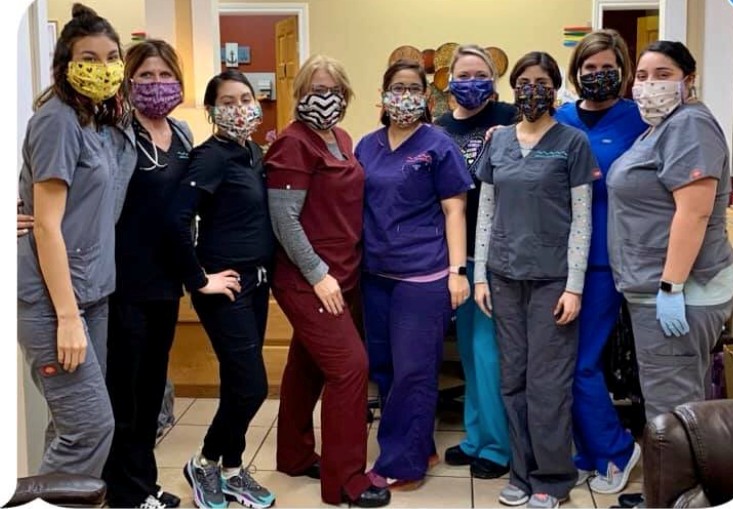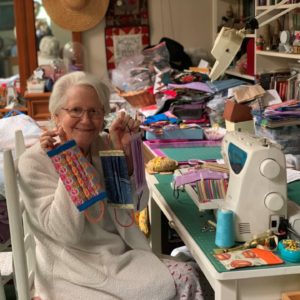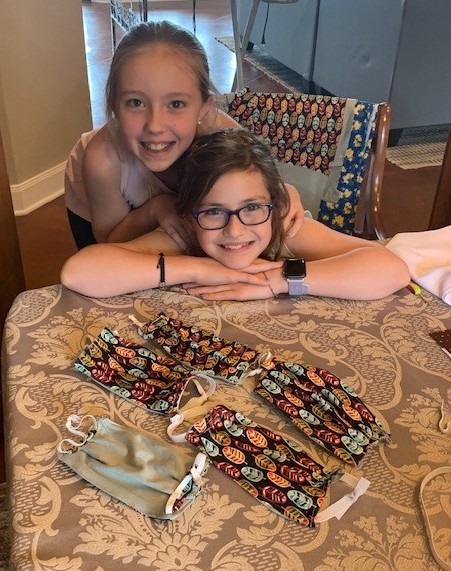Facing off against COVID-19
AgriLife Extension organization volunteers make face masks during time of critical need

The Texas A&M AgriLife Extension Service and its network of volunteers are responding to the shortage of personal protective equipment during the COVID-19 pandemic by providing badly needed face masks.
In a coordinated response to requests from throughout the state for face masks and to meet anticipated additional demand, AgriLife Extension has developed and initiated Operation Face Mask, said Joyce Cavanagh, Ph.D., AgriLife Extension specialist in family and community health and project coordinator, College Station.
Cavanagh said Operation Face Mask is enlisting the services of several AgriLife Extension volunteer organizations to make and distribute cloth face masks to help relieve some of the competition for N-95 medical face masks throughout the state.
The effort includes volunteers from the Texas Extension Education Association, 4-H clubs, Master Wellness Volunteer program, Healthy Texas program, Master Clothing group and Texas 4-H Ambassador program.
Cavanagh said the shortage of personal protective equipment has led many working in healthcare to seek other options.
“Many of our AgriLife Extension offices have received calls asking whether our volunteers can provide homemade face masks,” she said. “We heard from home health agencies, hospitals and clinics, family practice offices, assisted living facilities and cancer clinics.”

Cavanagh said once they put the word out to agency affiliated volunteer organizations the response was impressive.
“We received a quick response and a broader one than we had expected given the COVID-19 situation and shelter-in-place restrictions,” she said.
She said AgriLife Extension volunteers have already begun responding to requests from local and statewide healthcare providers. The volunteer response began March 23 in Hopkins County, and additional efforts are now underway in at least 11 additional counties, with more counties expected to participate.
“Our agents from participating counties have reported more than 1,100 masks have been produced and distributed so far, with about 90% of those going into their local communities,” Cavanagh said.”
The face masks are being made for use consistent with Centers for Disease Control and Prevention guidelines, Cavanagh said. Per CDC guidelines, health care professionals may use homemade masks for care of patients with COVID-19 as a last resort.
“These face masks are not being used as a substitute or replacement for N-95 masks,” said Angela McCorkle, AgriLife Extension program specialist – family and youth, also a coordinator for Operation Face Mask. “Homemade masks are not strictly for front-line use and should ideally be used in combination with a clear plastic shield that covers the entire front of the face from the top of the head to below the chin and over both sides of the face.”
She said healthcare locations using the masks will most likely employ them to help protect high-risk patients, including those with underlying medical problems, and to provide a degree of protection for people in waiting rooms and other areas where there may be a risk of infection.
“This will allow medical professionals to have access to more of the N-95 masks, which are so badly needed and in such short supply these days,” McCorkle said.
She said those making the masks are complying with local guidelines for sheltering in place, so this has been more of an individual project among AgriLife Extension organization volunteers.
“We have a system of collecting finished items that maintains recommended social distancing and disinfection protocols,” she said. “We suggested volunteers in high-risk categories get other volunteers to deliver materials for sewing and pick up finished items. We also suggest mask pick-up and delivery could be jobs for volunteers who do not sew and are not in COVID-19 high-risk groups.”

McCorkle also noted due to immediacy of need and shelter-in-place restrictions, many volunteers are using their own fabric and sewing supplies to make the masks, and that too has led to some unexpected shortages.
“One of the challenges has been that elastic is hard to find just now, and one of the mask patterns volunteers are following uses elastic, while another uses cloth ties,” she said. “And some of the healthcare facilities we’re trying to provide masks for prefer the ones made with elastic.”
Mask distribution is being coordinated through the county agent, a statewide cancer care network, state and local healthcare facilities and JoAnn fabric stores.
“In addition to a number of local requests, we were contacted by a statewide cancer care network that was willing to accept all the masks these volunteers could produce and either deliver to one of their many centers across the state or send to a specific center for statewide distribution.”
Cavanagh said volunteers will continue to make the face masks for as long as the need continues.
“This project has given AgriLife Extension and many of our AgriLife Extension volunteer groups an opportunity to participate in a project to meet the needs of communities as well as support a statewide effort,” Cavanagh said. “It proves that even when people can’t physically be in the same location, they can still work together to achieve a common purpose during a critical time.”


